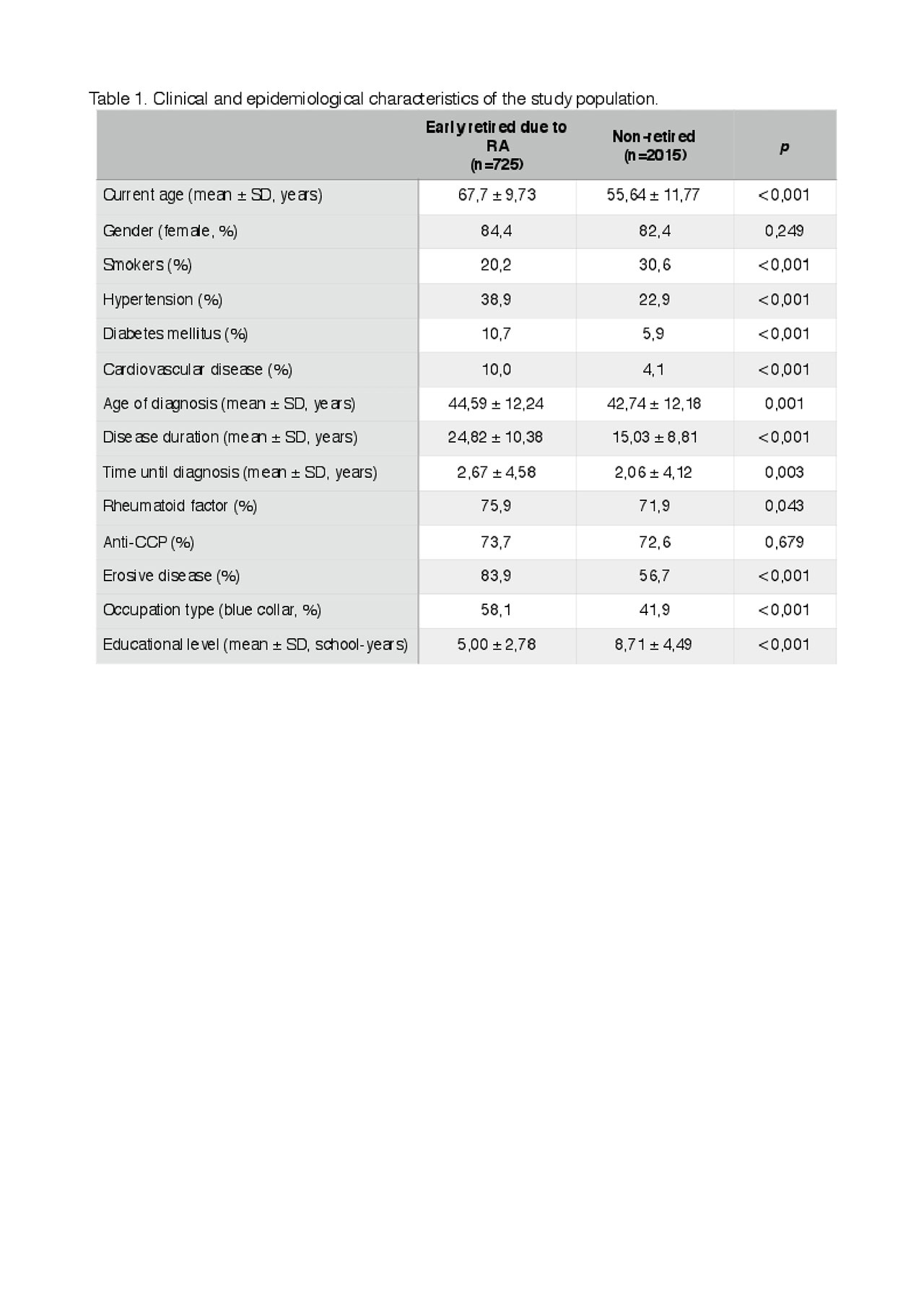Session Information
Session Type: Poster Session (Sunday)
Session Time: 9:00AM-11:00AM
Background/Purpose:
Work disability is a common consequence of Rheumatoid Arthritis (RA) with economic implications for both the patient and society. Scarce information is available on the possible causes for early retirement of RA patients in Portugal.
Aim: To evaluate the rate of early retirement due to RA in Portugal. Secondary aim consists in the identification of its main predictors.
Methods: Multicentric retrospective cohort study involving eleven portuguese rheumatology centers, including patients with RA according the ACR/EULAR 2010 or the 1987 ACR Classification Criteria for RA, based on Reuma.pt, the Portuguese Register of Rheumatic Diseases. Patients retired prior to RA diagnosis, never-employed or with missing information on current work status were excluded. Retirement due to RA versus non-retirement were compared using T-test or Chi-2 test as adequate. Variables with p< 0,05 in univariate analysis, and other potential predictors selected on clinical and epidemiological grounds, were included in multivariable binary logistic regression, while adjusting for potential confounding or contributing factors.
Results: 3231 patients were included (81,5% female, aged 60,8 ± 13,0 years, mean disease duration 18,0 ± 10,3 years). Until the present time, 37,6% (n=1216) of the patients retired, this being due to RA in 59,6% of the cases. Early retirement due to RA translated into 7 years of active work being lost when compared to patients retired to other causes (49,6 ± 9,5 vs. 56,6 ± 9,8 years). Compared to patients that are still professionally active, patients retired due to RA were diagnosed later in the disease process (2,7 ± 4,6 vs. 2,0 ± 4,1 years from first symptoms to RA diagnosis, p=0,003), had longer disease duration (24,8 ± 10,4 vs. 15,0 ± 8,8 years at the time of retirement, p< 0,001), were more likely positive for rheumatoid factor (75,9% vs. 71,9%, p=0,043), to present erosive disease (83,9% vs. 56,7%, p< 0,001), have a blue collar occupation (58,1% vs. 41,9%, p< 0,001) and have a lower educational level (5,0 ± 2,8 vs. 8,7 ± 4,5 school-years, p< 0,001). After multivariate analysis, independent predictors for early retirement due to RA were: later diagnosis (OR: 2,23; 95% CI 1,18-4,21/year, p=0,013), erosive disease (OR: 2,21 95% CI 1,54-3,16, p < 0,001), need for biologic therapy (OR: 1,32; 95%CI 1,01-1,73, p=0,045) and lower educational level (OR: 0,83; 95%CI 0,79-0,86/year, p< 0,001). Although a blue collar occupation was associated with a higher prevalence of early retirement, this association does not stand after adjusting for educational level (OR: 0,822; 95% CI 0,654-1,033).
Conclusion:
RA itself is the leading cause of early retirement in RA patients, being responsible for the loss of an average of 7 years of work. Late diagnosis, presence of poor prognosis factors (such as erosive disease and the need for biologic therapy) and lower educational level are the main predictors of early retirement associated with RA in Portugal.
To cite this abstract in AMA style:
Luís M, Garcia S, Guimarães F, António M, Fernandes A, Araújo F, Cunha R, Couto M, Pinto A, Silva L, Cruz M, Pereira da Silva J, Duarte C. Early Retirement Attributed to Rheumatoid Arthritis and Its Predictors in Portugal [abstract]. Arthritis Rheumatol. 2019; 71 (suppl 10). https://acrabstracts.org/abstract/early-retirement-attributed-to-rheumatoid-arthritis-and-its-predictors-in-portugal/. Accessed .« Back to 2019 ACR/ARP Annual Meeting
ACR Meeting Abstracts - https://acrabstracts.org/abstract/early-retirement-attributed-to-rheumatoid-arthritis-and-its-predictors-in-portugal/

